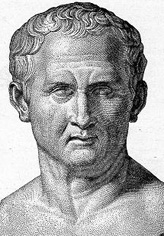 |
| Roman Tully |
 |
| Oakland Oakley |
Pathological altruism is "altruism in which attempts to promote the welfare of others instead result in unanticipated harm" with the proviso that while the altruist does not foresee harm that "an external observer would conclude was reasonably foreseeable." This can be summed up in the great Battle Cry of the Besserwissers: "What could possibly go wrong?" (Followed sooner or later by the plaintive "How were we supposed to know?")
This is also know to those with the Tragic View of Life as The Law of Unintended Consequences and it is the reason why the ukase of the self-indulgent that something is wrong iff it causes harm to another is unworkable as a basis for morality. What if the harm is unintended, but foreseeable by third parties? There is very little that may not cause harm to another, and that harm is not always foreseeable even to the well-intentioned. Oakley:
Empathy is not a uniformly positive attribute. It is associated with emotional contagion; hindsight bias; motivated reasoning; caring only for those we like or who comprise our in-group (parochial altruism); jumping to conclusions; and inappropriate feelings of guilt in noncooperators who refuse to follow orders to hurt others.Worse still, it leads to bad laws and regulations:
Ostensibly well-meaning governmental policy promoted home ownership, a beneficial goal that stabilizes families and communities. The government-sponsored enterprises Freddie Mac and Fannie Mae allowed less-than-qualified individuals to receive housing loans and encouraged more-qualified borrowers to overextend themselves. Typical risk–reward considerations were marginalized because of implicit government support. The government used these agencies to promote social goals without acknowledging the risk or cost. When economic conditions faltered, many lost their homes or found themselves with properties worth far less than they originally had paid. Government policy then shifted . . . the cost of this "altruism" to the public, to pay off the too-big-to-fail banks then holding securitized subprime loans. . . . Altruistic intentions played a critical role in the development and unfolding of the housing bubble in the United States.
 |
| Crazy Fred |
If we propose a program because we feel good about it and that makes it true, then those who oppose the program must be wicked liars: possibly "Jews" or "international bankers" or even (dare I say it) "Republicans." It depends on what milieu one finds oneself in.
Yet when a well-intentioned policy fails to produce the intended results and even produces undesirable ones, there is no way to get the policy revoked. By that time there are those with a vested interest in the policy. The Iron Law has set in and the program is run by people who are interested in their own status and not the well-being of those being ostensibly helped. They will resist any effort to divert the funds to a possibly more effective program. Their jobs are at stake! What do you expect them to do? And if you oppose the policy or program, you are obviously an ill-intentioned penny-pinching Scrooge (or Shylock, depending on the era) who hates (the alleged beneficiaries).
 |
| Drunken Sailors |
The problem with the intelligent design of the economy is not a lack of designs.
"Of all tyrannies, a tyranny exercised for the good of its victims may be the most oppressive. It may be better to live under robber barons than under omnipotent moral busybodies. The robber baron's cruelty may sometimes sleep, his cupidity may at some point be satiated; but those who torment us for our own good will torment us without end, for they do so with the approval of their own conscience." -- C.S. Lewis



It's worth noting that "altruism" originally meant something very much like "pathological altruism." I edited a biography of Auguste Comte, who coined the word, and it quoted him as saying that Jesus's moral teaching was bad because Jesus said "love your neighbor as yourself," meaning that he accepted that people loved themselves and even used that love as a standard; the right attitude, Comte said, was to love your neighbor and have no love for yourself—only a stern devotion to duty.
ReplyDeleteIt didn't take long for that harsh concept to be softened; in fact John Stuart Mill, who knew and admired Comte, wrote in a discussion of his views that altruism obviously couldn't mean that, but must mean good will to others—the kind of thing Adam Smith wrote about in The Theory of the Moral Sentiments, I suppose. And English speakers have tended to follow Mill's lead.
(Though I do have to say that strictly logical utilitarianism, where my interests are to count equally with everyone else's for me, may be mathematically very different from altruism, but in practice seems quite close to it; if my good has a weight of around 0.000000000143, for any human purposes it might as well be zero.)
I see a lot of this kind of thinking in my own Catholic circles. Quite a bit of the idea of what public charity is seems totally tainted with pathological altruism, as described here. "What would Jesus do?" is perceived as an unanswerable retort to any attempt to debate any item dealing with welfare or charity spending by the government. What the results of those policies ACTUALLY are don't seem to matter to too many people. They just want to help, so don't be a big evil meanie and talk about terrible anti-Christian things like 'how exactly is the government to pay for this, aside from maxing out more credit cards?'
ReplyDeleteTOF is announcing a new political movement: conservative liberalism. It insists that programs ostensibly intended to help the less fortunate actually do so. How radical!
ReplyDeleteBeware of people with good intentions.
ReplyDelete